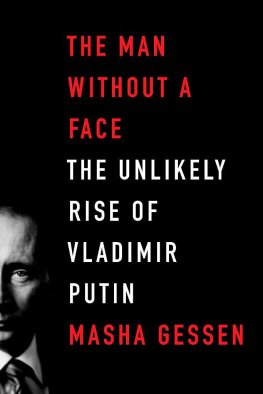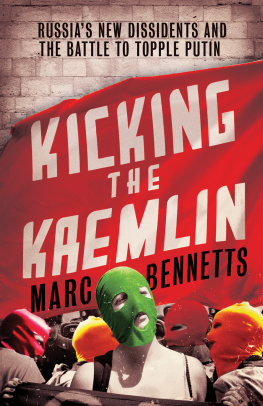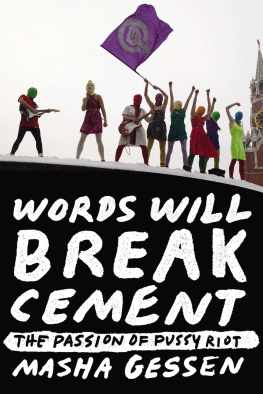PRAISE FOR
The Man Without a Face
In a country where journalists critical of the government have a way of meeting untimely deaths, Ms. Gessen has shown remarkable courage in researching and writing this unflinching indictment of the most powerful man in Russia.... Although written before the recent protests erupted, the book helps to explain the anger and outrage driving that movement.
The Wall Street Journal
Powerful and gracefully written... Gessens book flows on multiple tracks, tracing Putins life back to boyhood, the story of his hometown of St. Petersburg, and finally the last quarter-century of Russian history.... For all of the ghoulish detail, Gessens account of Putins Russia is not overwrought.... [She] displays impressive control of her prose and her story, painting a portrait of a vile Putin without sounding polemical.
San Francisco Chronicle
Written in English but with Russian heart, Gessen focuses on the places and institutions that bred the nations most resolute leader since Stalin... Some might say that Gessens interpretation is political. Of course it is... But more important, it is thorough. She has seen fellow journalists killed, has been harassed herself, and yet continues to write from Russia... Her urgency is felt on nearly every page.
Bookforum
[Gessen] shines a piercing light into every dark corner of Putins story... Fascinating, hard-hitting reading.
Foreign Affairs
Although Gessen is enough of an outsider to write beautifully clear and eloquent English, she is enough of an insider to convey, accurately, the wild swings of emotions, the atmosphere of mad speculation, the paranoia, and, yes, the hysteria that pervade all political discussion and debate in Moscow today.
The New York Review of Books
What Gessen sees in Putin is a troubled childhood brawler who became a paper-pushing KGB man and, by improbable twists and turns, rose to the top in Russia.... [She] does not attempt to weigh up Putins record but rather examines his biography, mind-set, and methods... as a thug loyal to the KGB and the empire it served who never had a clue about the earth-shattering events that blew the Soviet Union apart.
The Washington Post
Masha Gessen steps into the fray with a perceptive account of the new czar.
The Daily Beast
Part psychological profile, part conspiracy study. As a Moscow native who has written perceptively for both Russian and Western publications, Gessen knows the cultures and pathologies of Russia... [and has] a delicious command of the English language... A fiercely independent journalist... Gessens armchair psychoanalysis of Putin is speculative. But it is a clever and sometimes convincing speculation, based on a close reading of Putins own inadvertently revealing accounts of his life, and on interviews with people who knew Putin before he mattered.
The New York Times Book Review
[An] incisive bildingsroman of Putin and his regime... Alongside an acute apprehension of the post-Soviet dynamics that facilitated Putins rise, Gessen balances narratives of Putin-as-bureaucrat and Putin-as-kleptocrat with a wider indictment of the Mafia clan that retains him solely as its Godfather.
The Daily
Illuminating... It is with [the] explosive revelations that Gessen truly excels.... An electrifying read from what can only be described as an incredibly brave writer.
Columbia Journalism Review
Engrossing and insightful.
Bloomberg
A chilling and brave work of nonfiction.... With The Man Without a Face, Gessen has succeeded in convincingly portraying the forces that made Putin who he is today... [a] crafty, canny, power-hungry man whose hold on Russia shows no sign of slacking.
BookPage
ALSO BY MASHA GESSEN
Dead Again:
The Russian Intelligentsia After Communism
Ester and Ruzya:
How My Grandmothers Survived Hitlers War and Stalins Peace
Blood Matters:
From Inherited Illness to Designer Babies, How the World and I Found Ourselves in the Future of the Gene
Perfect Rigor:
A Genius and the Mathematical Breakthrough of the Century
The Man Without a Face:
The Unlikely Rise of Vladimir Putin
RIVERHEAD BOOKS
Published by the Penguin Group
Penguin Group (USA) LLC
375 Hudson Street, New York, New York 10014

USA Canada UK Ireland Australia New Zealand India South Africa China
penguin.com
A Penguin Random House Company
WORDS WILL BREAK CEMENT
Copyright 2014 by Masha Gessen
Penguin supports copyright. Copyright fuels creativity, encourages diverse voices, promotes free speech, and creates a vibrant culture. Thank you for buying an authorized edition of this book and for complying with all copyright laws by not reproducing, scanning, or distributing any part of it in any form without permission. You are supporting writers and allowing Penguin to continue to publish books for every reader.
An application to register this book for cataloging has been submitted to the Library of Congress.
First Riverhead trade paperback edition: March 2014
Riverhead trade paperback ISBN: 978-1-59463-219-8
eBook ISBN: 978-0-698-13594-9
Cover design by Alex Merto
Cover photograph by Denis Sinyakov
Book design by Tiffany Estreicher
While the author has made every effort to provide accurate telephone numbers and Internet addresses at the time of publication, neither the author nor the publisher is responsible for errors, or for changes that occur after publication. Further, the publisher does not have any control over and does not assume any responsibility for author or third-party websites or their content.
Version_1
CONTENTS
PROLOGUE
IK-14
G ERA WANTED TO PEE. Again. In the eleven hours we had spent in the car the day before, she had alternated every five minutes between asking if we were there yet and demanding to be allowed to pee. She did not sleep a wink, even though we arrived at one in the morning. Now, barely eight hours later, we were back in my car, on our way to the penal colony, and Gera wanted to pee.
Gera, you cannot pee every five minutes! said Petya to his four-year-old daughter. You cannot appraise a work of art from the point of view of effectiveness. Now he was speaking into a lapel mic that belonged to the German television crew following us in another car. Before we left the hotel in Zubova Polyana where we had spent the night, I had to pull the car away from the back porch so the Germans could film the lanky Petya running to the car with huge plaid Chinese-made rectangular bags we were taking to the colony for Nadya, Petyas wife and Geras mother. This is the sixth time Ive been filmed loading bags into a car for Nadya. He laughed as he got into the passenger seat. He always seemed to enjoy the publicity connected with his wifes imprisonment, and only now, more than a year after I first met him, was I starting to appreciate how hard, tedious, and unceasing was the work he did on her behalf.
While one of the Germans was miking Petya up, another tried to interview Gera, but she went suddenly tight-lipped and petulant. When the reporter walked away, I tried, in a sudden fit of competitiveness, to ask Gera some questions too. We had, after all, become familiar to each other after spending a day in the car together.

















